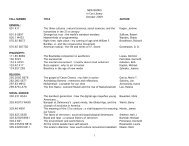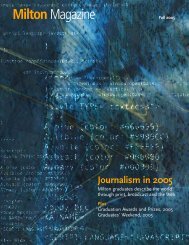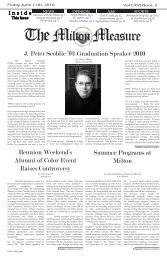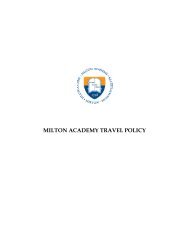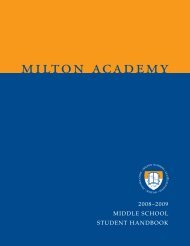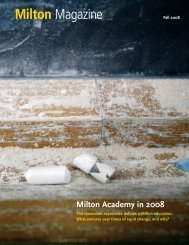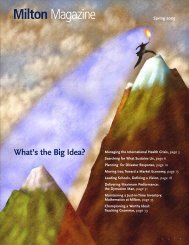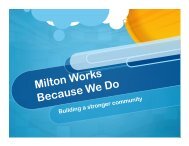Spring 2007 - Milton Academy
Spring 2007 - Milton Academy
Spring 2007 - Milton Academy
- No tags were found...
Create successful ePaper yourself
Turn your PDF publications into a flip-book with our unique Google optimized e-Paper software.
Sally Bowles ’56Sally Bowles has lived her remarkable professional life atthe intersection of big, bold ideas that would affect millionsof people, and the challenge of implementation. She hasfocused on making change happen. She was a member ofthe small team that worked with Sargent Shriver to developthe Peace Corps. She worked with John Lindsay to decentralizeNew York City public schools. She was the directorof Medicaid and then in charge of welfare programs for thestate of Connecticut. Sally left the public sector in 1990 toassist the president of the Rockefeller Foundation on amajor initiative with Nelson Mandela in South Africa andlater served as a consultant to the Rockefeller Foundationon its $45 million program to build international leadershipconcerning the global environment and sustainable development.She now is a director of the Charles & HelenSchwab Foundation and a consultant to several nationalnonprofits. Prior to that, she was president of the EmilyHall Tremaine Foundation. The Tremaine Foundation initiatedthe Coordinated Campaign for Learning Disabilities,the first national public-education campaign to informAmericans about learning disabilities. Sally has prolongedand enriched the legacy of public service established byher family.“When I entered <strong>Milton</strong>, we had been living in India fortwo years; my father (Chester Bowles) was PresidentTruman’s ambassador to India, right after Indian independence.Living there at that time was a pivotal experience. Myfather had left the business world in his mid-thirties to takeup public service; so for me, it was public sector all the way.“He was governor of Connecticut when I was 10, ambassadorwhen I was 12, and he went on to serve in Congress.I decided early on against running for elected office;I thought that what you had to do to get elected sort of distractedyou from the things you cared about getting done.“I have always been most gratified working at the junctionof vision and implementation. There are lots of great ideaslining the shelves. My strong suit has been not so muchdeveloping or researching more ideas as taking some of thegood ones off the shelf and making them useful for people.I particularly like start-ups, when all of the big, basic questionshave to be asked and answered—clarifying goals, pickingplausible strategies, determining how the organizationwill be structured, financed and staffed.“Six people began building the Peace Corps, and therewere many huge choices that were made by brilliant people,talking to one another about volunteers’ roles, and selection,and training—so many other things. Watching thatorganization grow was a fabulous education. Then Kennedydied, and I was looking around for the next ‘new frontier.’I thought it had to be John Lindsay in New York City.“That was hardly a start-up, but decentralizing the schoolswas a huge change in a large-scale operation. It was anentirely new experience to work with an established, highlyregulated bureaucracy with lots of history [New York Cityschool system, Connecticut Medicaid, then ConnecticutAFDC]. You had to ask the question: ‘How do you changewithout starting over?’ That’s a whole different set of challenges.I gravitate to the early stages of implementing animportant, big idea.L E A D E R S H I PMaking good ideas usefulBeginning with building the Peace Corps10 <strong>Milton</strong> Magazine



